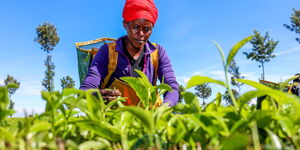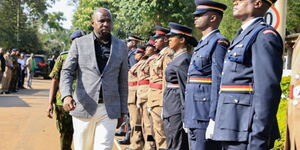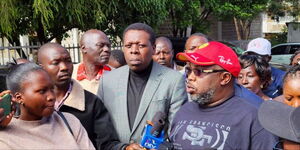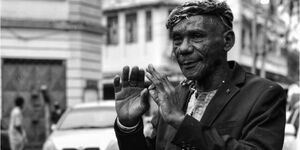Security personnel, including KDF, the National Police Service and the National Youth Service officers have been reportedly put on standby and those who were on leave recalled, as President Uhuru Kenyatta mulls over the decision to lock down the nation, if the Coronavirus crisis necessitates.
A report by Daily Nation on Friday, March 20, detailed that key resolves were made in the Cabinet meeting held on Thursday, March 19, with a key focus on avoiding a total lockdown.
The Cabinet argued that a national lockdown would cripple the economy and may trigger political and social confusion.
A strategy was thus laid down based on a proposal to have localised lockdowns as the government considered undertaking a density mapping of the country. This would enable it to have details such as who lives where and how it can provide crucial needs such as security, water and food.
The government would turn to its food reserves to provide these essentials before deciding to lock down parts of the country.
On Wednesday, March 18, Health CS Mutahi Kagwe addressed the possibility of a total lockdown as confirmed cases of Coronavirus (Covid-19) in Kenya rose to seven.
Kagwe stated that the National Emergency Response Committee would initiate a lockdown if they were advised to do so by a team of experts currently tracking the cases and creating models based on likely scenarios. He maintained that any decision to trigger a lock-down would be informed by facts and figures, not feelings.
"We will come to that point when the NERC has determined. We are not working by ourselves. We have got a very strong team of experts in this area who are modelling. We must be clear that we don't make decisions on the basis of a feeling," Kagwe stated.
Another decision on the table, for Kenyatta to consider, is calling for a national emergency. This aligns to Kagwe's decision to invoke the Public Health Act on Friday, March 13, after Kenya confirmed her first Coronavirus case.
The act disregards the privacy of Kenyans, indicating that the crisis affects the general public. The Cabinet's fear is that the outbreak of the disease may escalate, finding its way into the densely populated areas, which may in turn cripple the health system.
The public crisis may then shift into societal disruption as many Kenyans are reportedly not sensitised adequately on how to protect themselves from contracting the virus. An outbreak may affect the elderly and the ill who are most vulnerable to the virus.
A source informed Daily Nation that another measure being contemplated is to ban and restrict travels upcountry and also ban non-essential public transport in urban areas such as Nairobi, to restrict movement.
Social areas such as bars, nightclubs and hotels may also be ordered to close. Supermarkets and pharmacies may be allowed to offer services but the movement could be restricted to a few people at a certain time.












